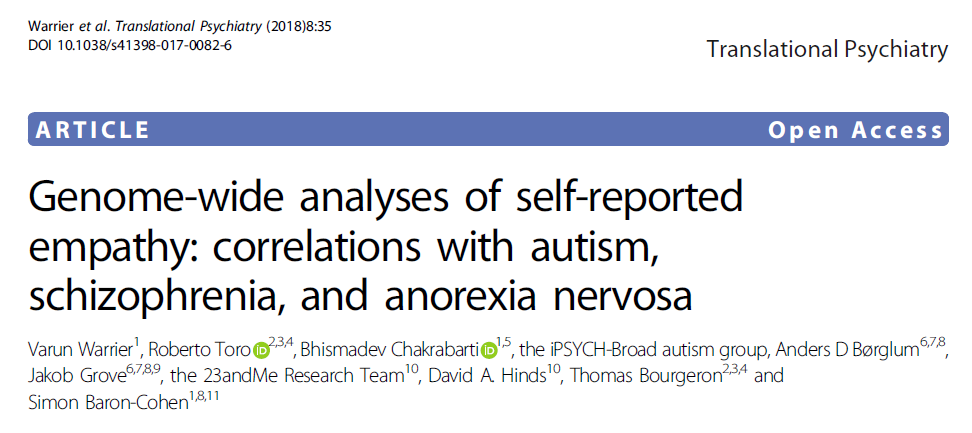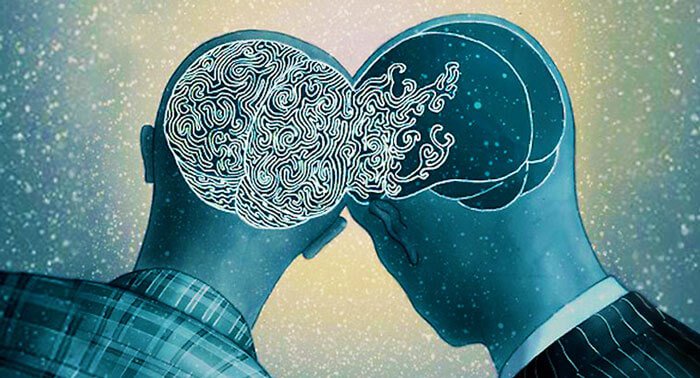Introduction: Empathy is also known as sympathy, etc. It refers to the ability to sense other people's feelings. It has been interpreted in the field of psychology. But recently, scientists at the University of Cambridge in the United Kingdom have discovered that our degree of empathy with our compatriots depends in part on the genes, which means that our ability to empathize with others may be related to genetics.

A genome-wide association study (GWAS) led by scientists at the University of Cambridge, UK, found that about 10% of the self-reported empathy was related to genetic factors. The study involved 46,000 volunteers who found that genes associated with low empathicity were associated with high autism risk, while genes positively associated with empathy slightly increased the risk of schizophrenia and anorexia nervosa. risk. In addition, the research data also shows that although women are generally more compassionate than men, the difference is not inherited, but is related to hormones or social environment.
Related research has recently been published on nature. The co-corresponding author, Simon Baron cohen, director of the University of Cambridge's Autism Research Center in the UK, commented on the discovery and said: “Part of the reason for affecting people’s empathy is due to genetic factors. This discovery helps us understand the autism patients who can hardly imagine the thoughts and feelings of others."
About empathy

Empathy includes cognitive empathy and emotional empathy. Cognitive empathy refers to the ability to recognize the thoughts and feelings of others, and emotional empathy refers to the ability to respond with appropriate emotions. "Compassion is the ability to recognize and respond to other people's emotional states. It is an important psychological process that helps to guide and maintain social life. This is important for happiness," the authors stress.
Previous studies
Previous psychological studies have shown that empathy may be related to certain mental illnesses. However, whether there is an inevitable causal relationship between empathy and the risk of mental illness is not yet understood. The author wrote: "Although early experience, parenting methods, and other social factors have a direct impact on empathy, there is still a variety of evidence that empathy is physiological to a certain extent." However, empathic The genetic basis has not been studied in depth. To date, no study has been conducted to systematically study the genetic structure of empathy through GWAS.
Cambridge University’s research team had previously developed a validated “empathy” (EQ) self-report measurement method that measures cognitive and emotional empathy. In the current study, the researchers collaborated with the scientists of the Diderot University in Paris and the French National Institutes of Sciences (CNRS) and the gene company 23andMe to carry out more than 46,000 volunteers (they are participants in the 23andMe study). Research. Each participant completed the EQ online and provided saliva samples for analysis.
GWAS results
The GWAS results did not reveal any significant single-nucleotide polymorphisms (SNPs) in the whole genome, but highlighted 22 suggestive sites. In addition, the researchers also conducted an analysis to link EQ with autism, attention deficit hyperactivity disorder (ADHD), anorexia nervosa, bipolar disorder, and depression, and then find out about these mental disorders and gender. Specificity of relevance. The results highlight the negative relationship between EQ and autism. The author wrote: "We found a significant negative correlation between EQ and autism." "This difficulty in empathy may lead to a disability, which is as challenging as other types of disability." Dr. Baron Cohen Say. "Our society needs to support these people with disabilities and adopt innovative teaching methods, workarounds or rational adjustments to promote mutual inclusion."
The GWAS data also highlights the significant genetic relationship between EQ and schizophrenia or anorexia nervosa, which is related to gender. "We found a significant genetic correlation between female EQ and anorexia and a certain genetic correlation between male EQ and autism," the investigators noted. In addition, they also found that there is no obvious genetic basis for gender differences in empathy.
Significance
The authors of the paper indicate: "This is the first genetic system to study self-reported empathy. The results of the study have demonstrated that empathy-related gene mutations have an impact on people's mental status and psychological characteristics."
"This is an important step in understanding the role of genetics in empathy," added Varun Warrier, co-author of Cambridge University. "Although only one-tenth of the difference in degree of empathy among individuals is attributed to genetics, understanding genetics The factors are still very important."
Dr. Thomas Bourgeron, Professor of Diderot University, summed up: “These results provide a new perspective for studying the genetic factors that support empathy, but because each specific gene plays a minor role, it is still difficult to identify them. ."
“The next step is to study more people, duplicate these discoveries and pinpoint the biological pathways associated with individual differences in empathy,” Dr. Bourgeron pointed out.

References:
Human Empathy Linked with Genetic Variation
Souce: NovoPro 2018-03-14
